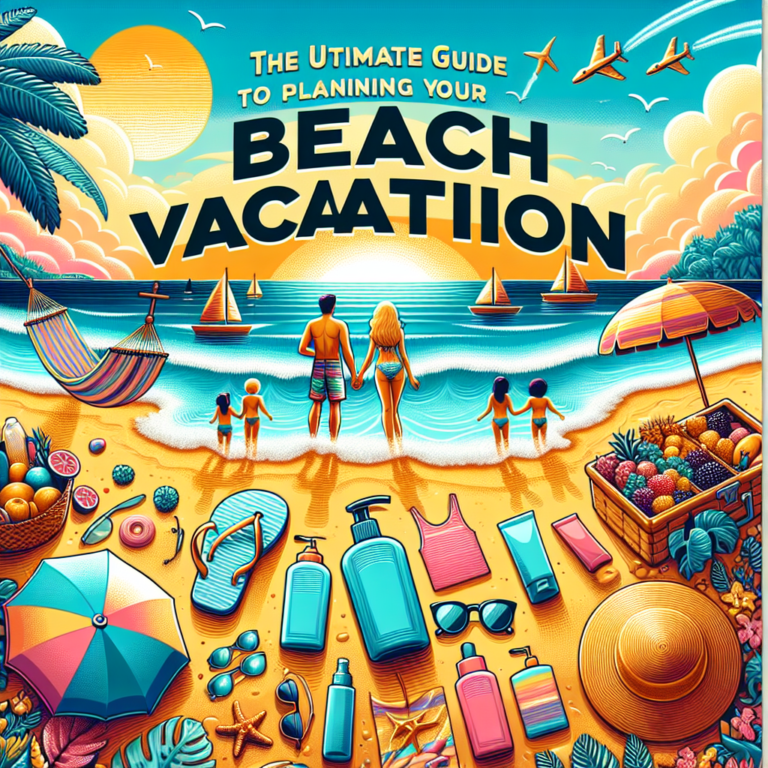Mastering The Art Of Budget Travel: A Comprehensive Guide
Are you someone who loves to travel but finds that your budget often holds you back? Well, fret no more! We have compiled a comprehensive guide that will teach you the art of budget travel, allowing you to see the world without breaking the bank. From destination recommendations to travel planning advice, our guide caters to a diverse audience seeking budget-friendly options and tips. Whether you’re a seasoned traveler or a wanderlust-filled dreamer, our guide will provide you with the insights and information you need to make the most out of your budget travel experience. Join us as we embark on an exciting journey to help you become a master of budget travel.
Understanding Budget TravelDefining Budget Travel
Budget travel refers to a style of traveling where you prioritize saving money without compromising on the quality of your travel experience. It involves finding affordable ways to travel, stay, eat, and explore various destinations. The goal is to make the most out of your travel budget and stretch your dollars as far as possible.
The Appeal of Budget Travel
Budget travel is appealing for several reasons. Firstly, it allows you to experience new places and cultures without breaking the bank. It opens up opportunities for individuals who have limited financial resources but still have a strong desire to explore the world. Additionally, budget travel often leads to more authentic experiences as you immerse yourself in the local culture and interact with locals on a more personal level.
Common Myths about Budget Travel
There are several myths surrounding budget travel that may discourage some individuals from giving it a try. One common myth is that budget travel means compromising on comfort and safety. However, with careful planning and research, it is possible to find affordable accommodations and transportation options that meet your needs. Another myth is that budget travel is only for young backpackers. In reality, people of all ages can successfully embark on budget travel adventures. It’s all about finding the right balance and tailoring your trip to fit your personal preferences and priorities.
Setting a Travel BudgetDetermining Your Travel Priorities
Before setting a travel budget, it’s essential to determine your priorities for the trip. Consider what aspects of travel are most important to you. Are you more interested in exploring famous landmarks, indulging in local cuisine, or immersing yourself in local culture? By identifying your priorities, you can allocate your budget accordingly and ensure that you have a fulfilling travel experience.
Creating a Realistic Budget
Once you’ve determined your priorities, it’s time to create a realistic budget. Start by estimating the costs of your major expenses, such as transportation, accommodation, meals, and activities. Consider factors such as the destination’s cost of living, currency exchange rates, and the duration of your trip. Be sure to leave room for unexpected expenses and remember to account for any pre-trip expenses like visas or travel insurance.
Tips for Sticking to Your Budget
Sticking to a budget can sometimes be challenging, but with a few tips, you can stay on track. Research and plan ahead to find the best deals on flights, accommodation, and activities. Consider using budgeting apps or spreadsheets to track your expenses throughout your trip. Be flexible and open to adjusting your itinerary based on cost-saving opportunities that may arise. Finally, prioritize experiences over material things and focus on making memories rather than accumulating souvenirs.
Choosing Affordable DestinationsResearching Low-Cost Destinations
When choosing a budget-friendly destination, it’s important to do your research. Look for destinations where the cost of living is lower than in your home country. Consider countries in Southeast Asia, Eastern Europe, or South America, as they often offer affordable travel options. Keep an eye out for deals on flights and accommodations and take advantage of off-peak travel seasons for even more savings.
Considering Off-Season Travel
Traveling during off-peak seasons can significantly reduce your expenses. Popular tourist destinations tend to have higher prices during peak seasons, so consider visiting during less crowded times when prices are lower. Not only will you save money, but you will also experience fewer crowds and have a more authentic interaction with the locals.
Comparing the Cost of Living in Potential Destinations
The cost of living varies from one destination to another, so it’s crucial to compare the expenses you may incur in each potential destination. Research the prices of accommodation, transportation, meals, and attractions to get a sense of the overall cost. Keep in mind that in some cases, a higher cost of living may be offset by other factors such as free attractions or inexpensive local transportation.
Finding Budget AccommodationUnderstanding the Different Types of Accommodation
There are various types of budget accommodation options available for travelers. Hostels are a popular choice among budget travelers as they offer affordable dormitory-style rooms or private rooms at a lower cost than traditional hotels. Guesthouses or bed and breakfasts are another option, providing a more intimate and local experience. Vacation rentals, such as Airbnb, can also be budget-friendly, especially if you’re traveling with a group.
Weighing Cost Against Convenience
When it comes to budget accommodation, it’s essential to strike a balance between cost and convenience. While it may be tempting to choose the cheapest option available, consider factors such as location, amenities, and safety. Opting for accommodation that is centrally located or close to public transportation can save you money on transportation costs and allow you to make the most of your limited time.
Utilizing Booking Sites for Best Deals
Booking sites can be a valuable tool when searching for budget accommodation. Websites like Booking.com, Agoda, or Hostelworld offer a wide range of options at various price points, allowing you to compare prices and read reviews from previous guests. Taking the time to compare different options and booking in advance can often result in significant savings.
Budget-Friendly Meals and DiningEating Like a Local
One of the best ways to save money on meals while traveling is to eat like a local. Avoid dining at touristy restaurants and instead opt for local eateries, street food stalls, or food markets. Not only will you experience authentic cuisine, but you’ll also enjoy significant savings. Ask locals for recommendations or explore places away from major tourist attractions for the best value.
Cheap Eats and Street Food
Street food is not only delicious but also budget-friendly. In many destinations, street food vendors offer a wide variety of affordable and tasty options. Be sure to choose vendors with sanitary practices and follow the locals’ lead when it comes to popular stalls. Additionally, look out for local markets where you can purchase fresh fruits, snacks, and local ingredients to prepare your own meals on a budget.
Managing Meal Expenses
To manage your meal expenses effectively, consider setting a daily or weekly food budget. This will help you make conscious choices about where and what to eat. Eating larger meals during the day and opting for lighter dinners can also help you save money. Additionally, research if your accommodation offers breakfast, as this can be a great way to start the day without having to spend extra on a meal.
Saving on TransportationPublic Transport Versus Rental Cars
When it comes to transportation, opting for public transportation is often the most budget-friendly choice. Utilize buses, trains, or trams to get around a city or between destinations. Public transportation not only saves you money but also allows you to experience the local way of commuting. On the other hand, rental cars can be expensive, especially when factoring in gas, parking fees, and insurance.
The Benefits of Walking and Biking
Walking and biking are not only cost-saving options but can also enhance your travel experience. Many cities have well-developed pedestrian-friendly areas or rentable bikes for tourists. Exploring a city on foot or by bike allows you to discover hidden gems, interact with locals, and save money on transportation costs.
Finding The Cheapest Flights
When it comes to finding the cheapest flights, flexibility is key. Be open to traveling on weekdays or during off-peak hours, as these often offer lower prices. Use flight comparison websites, such as Skyscanner or Kayak, to compare prices from different airlines. Sign up for fare alerts or newsletters to stay updated on any deals or promotions. Booking well in advance or being spontaneous and booking last-minute can also result in significant savings.
Travel Insurance on a BudgetUnderstanding the Importance of Travel Insurance
Travel insurance is an essential aspect of any travel plan, including budget travel. It provides financial protection in case of unexpected emergencies, such as medical expenses, trip cancellations, or lost luggage. While it may seem like an additional expense, the peace of mind it offers is priceless.
Finding a Cost-Effective Insurance Plan
To find a cost-effective travel insurance plan, compare different options from reputable insurance providers. Look for plans that offer coverage for medical emergencies, trip cancellations, and lost or stolen belongings. Consider your individual needs and the activities you plan to undertake during your trip. Be sure to carefully read the policy terms and conditions to understand what is covered and any exclusions.
Weighing Insurance Coverage Against Potential Risks
When budgeting for your trip, be sure to factor in the cost of travel insurance. While it may add to your expenses, it is crucial to protect yourself against potential risks. The cost of medical emergencies, trip cancellations, or lost belongings can far exceed the cost of insurance. By weighing the potential risks against the coverage offered by different insurance plans, you can make an informed decision that aligns with your budget and needs.
Free and Low-Cost ActivitiesResearching Free Tourist Spots
Many destinations offer a variety of free attractions or activities for travelers. Research and make a list of free tourist spots in your chosen destination. These can include museums with free admission days, public parks, historical sites, or cultural events. By planning your itinerary around these free options, you can have a fulfilling travel experience without spending a fortune.
Utilizing City Passes
City passes or tourist cards can be a great investment for budget travelers. These passes often provide discounted or free entry to popular attractions, as well as free or discounted transportation options. Research if your destination offers any city passes or tourist cards and evaluate if the cost justifies the savings you’ll receive. Consider the attractions included, the duration of the pass, and your planned itinerary to determine if it’s worth purchasing.
Enjoying Nature and Outdoor Activities
Nature offers abundant opportunities for free or low-cost activities. Hiking, swimming in natural springs, picnicking in parks, or exploring scenic areas cost little to no money. Research the natural attractions and outdoor activities available in your destination and take advantage of the beautiful surroundings. Not only will you save money, but you’ll also have the chance to connect with nature and create lasting memories.
Managing Money While TravelingAvoiding Foreign Transaction Fees
Foreign transaction fees can quickly add up and eat into your travel budget. To avoid these fees, consider opening a travel-friendly credit card or using a debit card that offers no or low foreign transaction fees. Additionally, withdrawing cash from ATMs in the local currency can often result in better exchange rates than exchanging money at currency exchange booths or airports.
Using Cash Versus Cards
While using cards can be convenient, it’s also essential to have some cash on hand. Some places may only accept cash, especially in local markets or street vendors. By carrying a reasonable amount of local currency, you can avoid the inconvenience of not being able to make a purchase. However, be cautious, and keep your cash safe by using a money belt or hiding it in a secure place.
Safeguarding Your Money While on the Road
Keeping your money safe while traveling is crucial. Consider using a money belt, neck wallet, or other travel security accessories to keep your cash and cards secure. Avoid carrying large sums of money with you and consider splitting your money into multiple locations to minimize the risk of losing everything in case of theft. Additionally, make copies of important documents such as your passport, travel insurance, and credit cards, and store them separately from the originals.
Budget Travel Mistakes to AvoidOverlooking Hidden Costs
One common mistake is overlooking hidden costs when budgeting for a trip. Expenses such as visa fees, tourist taxes, or transportation costs to and from the airport can quickly add up. Take the time to research and consider all potential expenses while creating your budget to avoid any surprises.
Underestimating Daily Expenses
Another mistake is underestimating daily expenses. While it’s important to set a daily budget, it’s equally important to be realistic about how much things cost in your destination. Research average prices for meals, transportation, and attractions to ensure your daily budget is adequate. Remember to account for occasional splurges or unexpected expenses that may arise.
Failing to Plan in Advance
Failing to plan in advance can lead to unnecessary expenses. Last-minute flights and accommodations tend to be more expensive, and limited availability may restrict your options. By planning in advance, you can take advantage of early bird discounts, affordable accommodation options, and budget-friendly activities. Additionally, planning allows you to create a realistic itinerary and make the most of your time at each destination.
In conclusion, budget travel is a fantastic way to explore the world without breaking the bank. By understanding the principles behind budget travel and implementing the tips and strategies mentioned in this comprehensive guide, you can embark on memorable adventures while keeping your finances in check. Remember, budget travel doesn’t mean sacrificing quality or experiences. It’s all about being resourceful, flexible, and making conscious choices to ensure you have an incredible journey within your budget. Happy travels!







